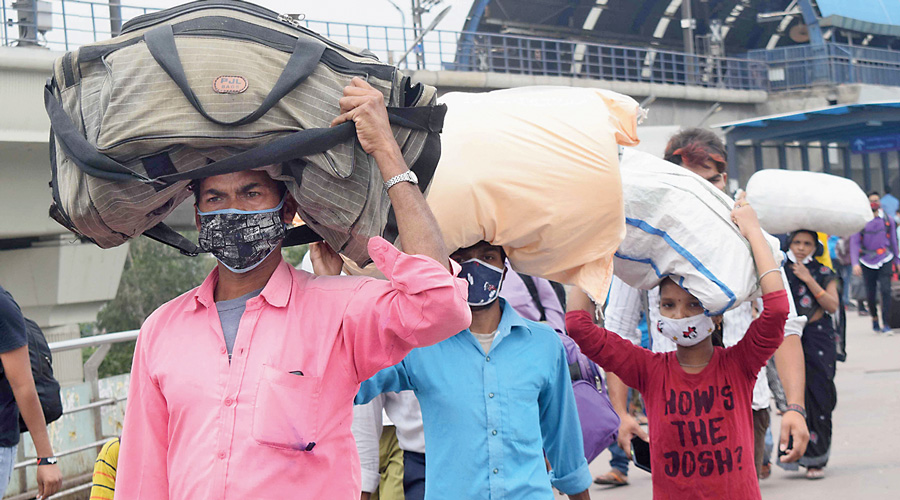With the announcement of a strict countrywide shutdown from July 1 to check the spread of COVID-19, thousands of migrant workers fled Dhaka, Bangladesh's capital, on Sunday as the tightened lockdown will curtail most economic activity and confine people to their homes.
Restrictions on activities and movement have been in place since mid-April as cases and deaths jumped.
Bangladesh on Friday announced a strict countrywide shutdown until further notice to check the spread of COVID-19, as it reported 108 deaths from coronavirus, the second highest single-day toll since the pandemic's outbreak in the country.
"Other than emergency services, all government and private offices will remain closed . . . No one will be allowed to go out of home without urgent reasons," an official order said.
Only goods-laden and emergency vehicles will be allowed to operate during the lockdown, it said.
Health officials said the deadly Delta variant of the coronavirus, first identified in India, has spread to Dhaka, mounting pressure on health facilities in the country's capital.
The coming closure has sparked an exodus from Dhaka, reports NDTV.
With public inter-city transportation already suspended since June 22, people have squeezed into rickshaws, hopped onto motorbikes and even hired ambulances to make their way to their villages.
Ferries have been operating on overdrive, with some running services 24 hours a day and cramming more than 1,000 passengers onto each trip.
At a river station in the rural town of Sreenagar about 70 kilometres (43 miles) south of Dhaka, thousands queued from early Sunday to cross the Padma, a tributary of the Ganges.
"We did not have any choice but to leave the city," Fatema Begum, 60, told AFP while waiting for a ferry.
"During lockdown, there is no work. And if we don't work, how do we pay rent? So, we packed up everything and are going back to our village."
Mohammad Masum, 30, a street vendor in Dhaka, said it was better to return home and "spend the time with family" than be confined in the capital.
Bangladesh on Sunday reported 119 deaths from COVID-19 in the last 24 hours, the highest single-day toll since the pandemic began, as the government prepares for an all-out lockdown from July 1 to contain the spread of the deadly virus.
"A total of 119 people died of COVID-19 in the country in the last 24 hours, taking the death toll to 14,172," the Directorate General of Health Services (DGHS) said in a statement.
The new hotspot Khulna reported 32 deaths, the highest among the eight divisions, followed by Dhaka with 24 deaths. Chittagong and Rajshahi divisions counted 22 deaths each while Rangpur 9, Sylhet 5, Mymensingh, 3 and Barisal 2.
The new record surpassed the previous high of 112 on April 19 this year.
The health authorities' report came hours after the Public Administration Ministry said they awaited a government decision to enforce a two-week long nationwide shutdown in line with the National Technical Advisory Committee (NTAC) on COVID-19.
We are ready to enforce the shutdown anytime...it (enforcement) will be tougher than that of last year, Junior Minister for Public Administration Farhad Hossain told reporters.
NTAC said they have recommended a strict countrywide lockdown when no offices other than emergency services would operate as their experts were convinced that the worsening situation could not be controlled without a nationwide shutdown.
Bangladesh is experiencing an increase in the COVID-19 infection rate, with the latest report of the World Health Organisation (WHO) noting that out of the country's 64 administrative districts 43 were at very high risk while 15 others, including Dhaka, were at high risk.
Authorities last week ordered a lockdown in seven central districts surrounding Dhaka in an effort to isolate the capital from the rest of the country to prevent community transmission in view of rising infection cases in bordering regions.
But experts said the Delta variant made its way to the capital through community transmission and the doctors said the number of COVID-19 patients was increasing every day at hospitals.
The country's biggest state-run health facility, Dhaka Medical College Hospital (DMCH), said 80 per cent of their COVID-19 patients were residents of the capital city and the number is increasing every day.
"The number of COVID-19 patients is increasing everyday at DMCH and 80 per cent of them are residents of Dhaka city . . . this means infection rate is increasing in the capital, DMCH Director Brigadier General Md Nazmul Haque told the state-run BSS news agency.
Haque said the current number of COVID-19 patients in DMCH was nearly four times higher than that of last month and feared if this trend continued all general and ICU beds in the city will be fulfilled within 10 to 12 days.
Bangabandhu Sheikh Mujib Medical University (BSMMU) Hospital reported a nearly identical picture with its additional director Nazmul Karim Manik saying pressure (of coronavirus patients) is mounting gradually and most of them are from Dhaka.
Institute of Epidemiology, Disease Control and Research (IEDCR) Director Prof Dr Tahmina Shirin said districts bordering India are more exposed to the Delta variant compared to Dhaka.
The Delta variant is largely responsible for the recent spike of the coronavirus cases...We must check people's movement in border districts to contain the community transmission, Shirin said.
DGHS officials said the situation in districts with borders with India particularly in southwestern Khulna region continued to worsen and at places the COVID-19 positivity rate were found to be 100 per cent.










